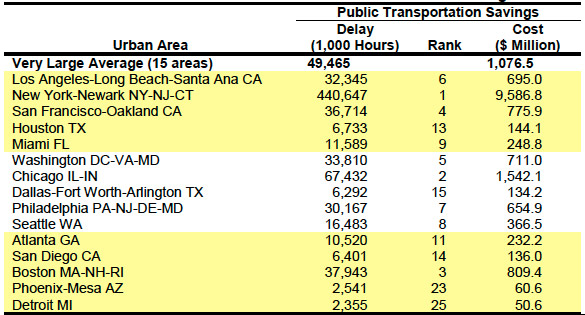
Generally when rankings of any sort get released, the focus is on the most frightful numbers. For instance:
The average Chicago-area commuter wasted 51 hours and about $1,100 in gas in 2011 while stuck in traffic, a just-released study has found.
The Chicago area ranked third in the nation — behind New York and Los Angeles — in terms of automobile travel delays and fuel wasted while in traffic for the same time period, according to Texas A&M Transportation Institute’s 2012 Urban Mobility Report.
This, unfortunately, conflates two things about the study. Our third-in-the-nation rank is raw numbers, and is to be expected given that Chicago is the third-largest metropolitan area in the country and a major shipping hub besides its already large population. The UMR reports that we're seventh in yearly hourly delay per auto commuter, and 14th in the "travel time index" (ratio of travel time in peak periods to free-flow). We're tied with Atlanta (9th biggest metro area), just behind Houston (5th biggest), and just ahead of Philadelphia (6th biggest). Big cities are congested; Chicago is reasonably functional, though it's been getting worse.
The metro residents that should really be fretting are those in the Washington, D.C. area—they're number one in yearly delay per commuter, 16 hours more than Chicago; number one in excess fuel (eight gallons); number one in congestion cost (about $250 more per commuter). Of course, D.C. is growing and its economy is thriving; it can be difficult to separate bad infrastructure trends from good economic trends, and vice versa, at least from numbers like these alone. D.C. is fifth in total travel delay and excess fuel consumed overall, despite being the seventh-largest metro.
But there's some good news if you dig deeper into the report. Take this table of "solutions to congestion problems":

Again, these are raw numbers, but Chicago fares pretty well in the CTA/Metra impact on commuting. You can really see the impact of public transportation on dense, older eastern cities compared to sprawling western and southern cities with less robust public transportation networks: Boston (10th largest) ranks higher than L.A. (3rd largest) in delay and cost savings. Philadelphia and D.C. (six and seven) rank ahead of Houston and Dallas (four and five). New York-Newark, of course, far exceeds everyone—it's the largest metro in the country, with the best public transportation system, and that scales.
The Chicago commuters who should be especially concerned are those whose job is commuting: truckers.

Chicago has a lot of truck traffic, because it's such a major transportation hub (PDF):
Most of the Chicago containers are shuttling between western and eastern railroads, or are destined for the Midwest market area. Truck VMT on urban highways in Illinois is in the 13 to 15 percent range (7), which is much higher than the national average. The principal highways serving Chicago’s container traffic carry nearly 30,000 trucks per day. In comparison I-710 in California, serving the ports of Los Angeles and Long Beach, carries about 39,000 trucks per day (7). These traffic levels highlight the influence of major port and logistics centers in generating truck VMT.
We've got the most truckers in the country. And the number one truck bottleneck in the country, as of 2011, and two of the top six—the 290/90/94 junction and the 90/94 junction, respectively (in 2009, they were the top two in the country).
Back from its earliest days, Chicago was built on its status as a shipping hub: "About half of all intermodal traffic in the U.S. moves through greater Chicago, making the region the largest intermodal container handler in the western hemisphere in 2010." Which is why so much attention has been devoted to rail recently, and Chicago's horrible rail bottleneck (which encourages more truck traffic, which leads to more congestion); we've got a plan, but the plan won't work without the train.
Photograph: SERED.4K (CC by 2.0)


